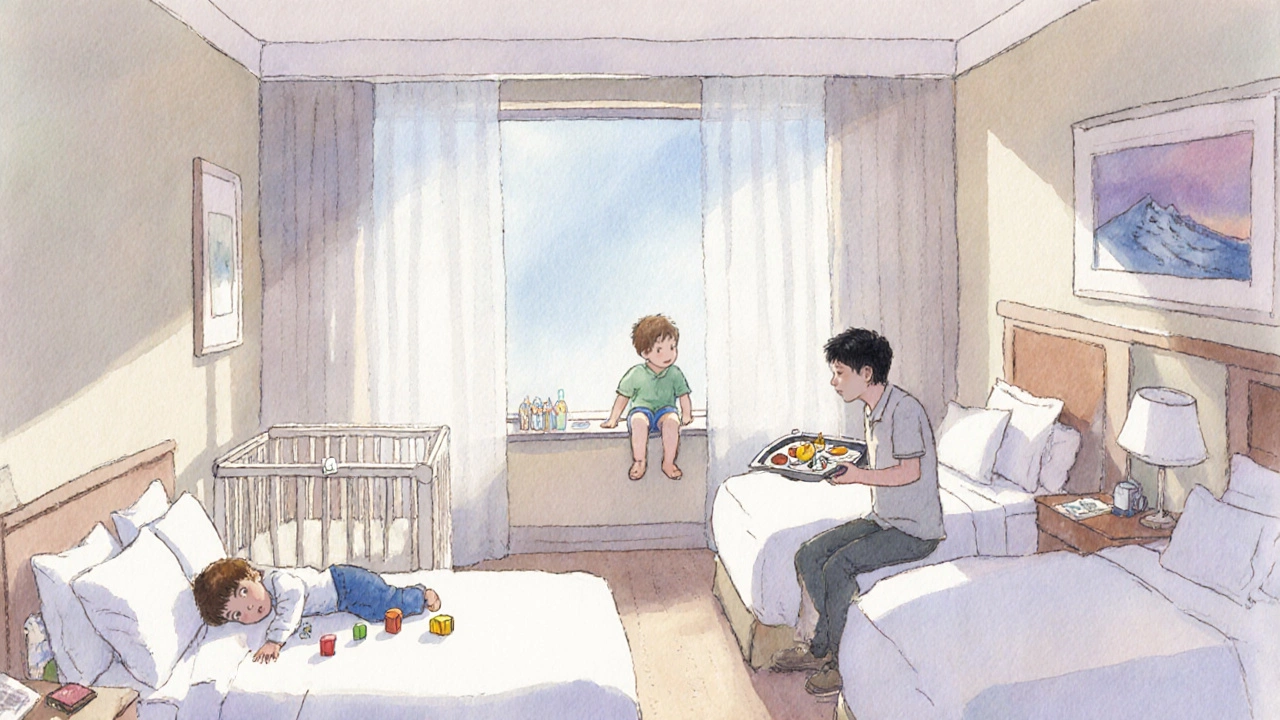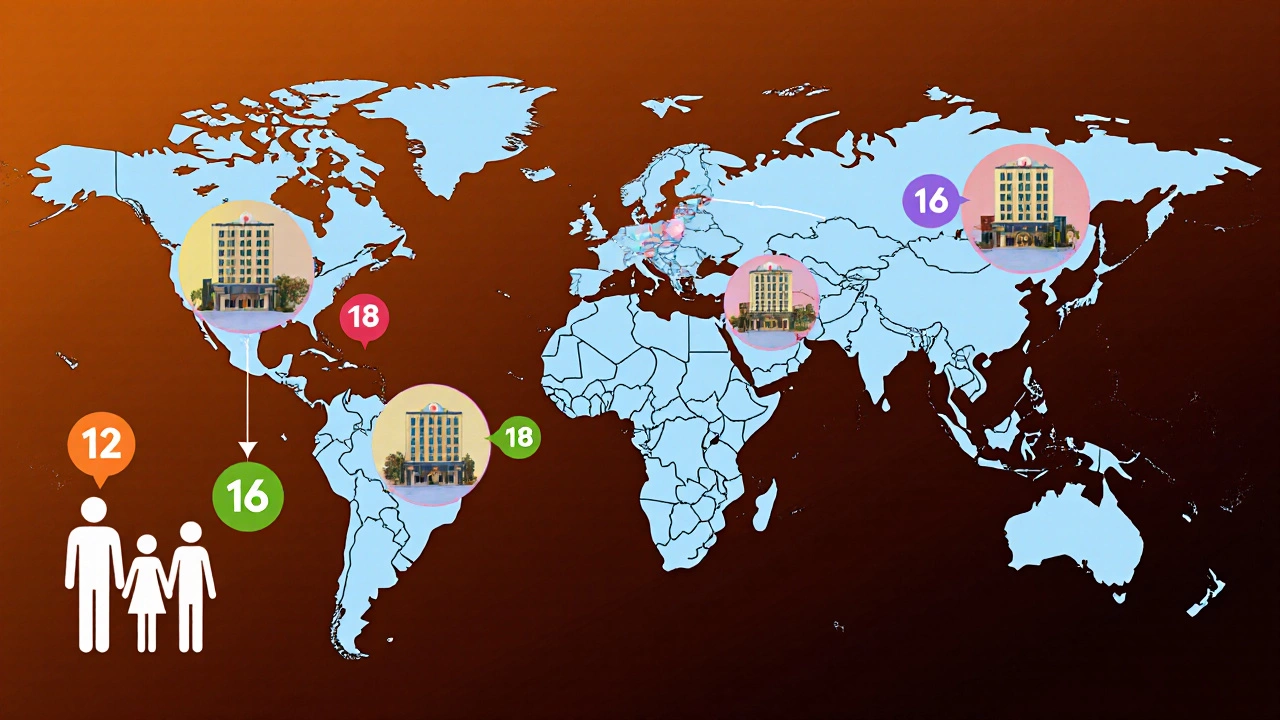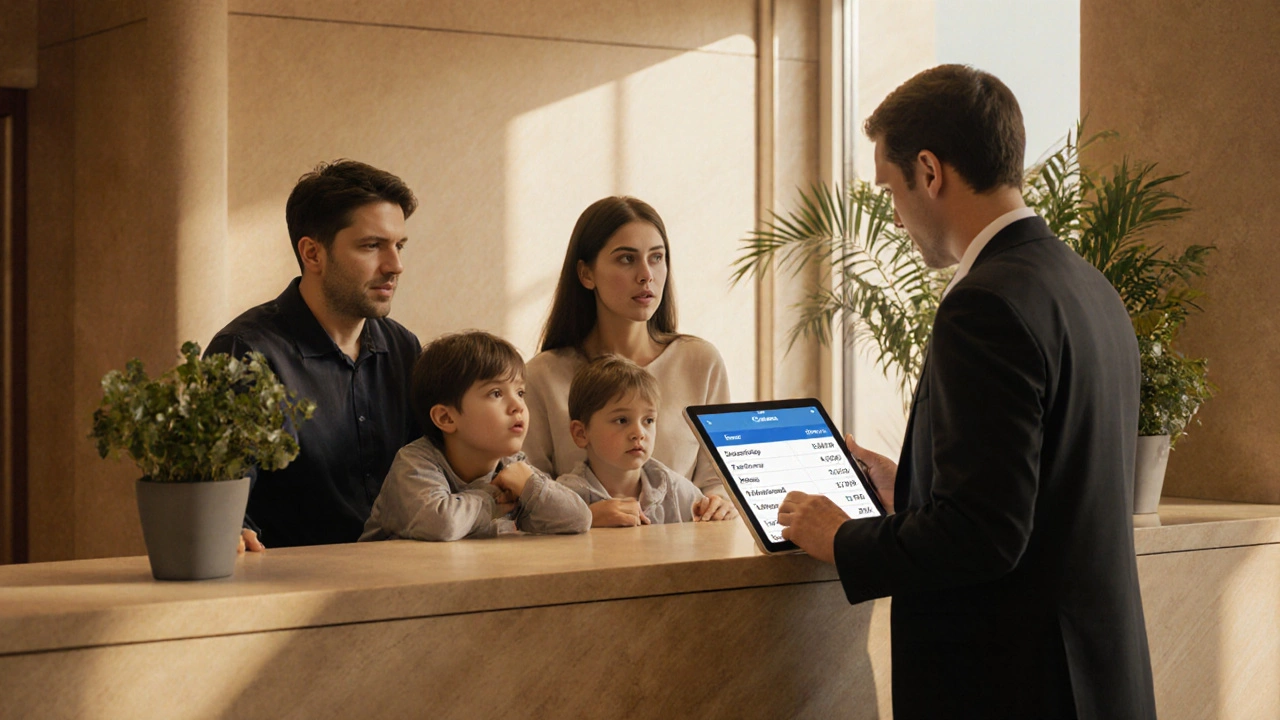When you’re booking a family trip, one of the first questions that pops up isn’t about pools or breakfast-it’s about age. What age is considered a child for hotels? It seems simple, but the answer changes depending on where you are, who you’re booking with, and even what time of year it is.
Some hotels let kids under 12 stay free. Others draw the line at 17. A few even treat 18-year-olds as adults. If you’re planning a trip with teens, toddlers, or a mix of both, guessing wrong can mean extra charges, cramped rooms, or worse-a surprise bill at checkout.
There’s No Universal Rule
Hospitals have clear guidelines. Schools have age cutoffs. But hotels? They’re free to set their own rules. That’s why a hotel in Orlando might say kids under 12 are free, while one in Paris considers anyone under 18 a child. There’s no global standard. Even chains like Hilton, Marriott, or Accor vary by region and brand.
For example, a Hilton Garden Inn in the U.S. often lets children under 18 stay free in their parents’ room. But a Hilton in the UK might cap it at 16. Meanwhile, a family resort in Spain could include kids up to 15 in their ‘child rate’ and charge for anyone older-even if they’re still in high school.
The reason? Taxes, local labor laws, and how each hotel calculates occupancy limits. In some countries, adding a person over 18 means the room must meet stricter safety or space requirements. That’s why you’ll often see a note like: “Maximum occupancy: 2 adults + 2 children under 12.”
What “Child” Usually Means in Practice
Even though rules vary, most hotels follow a rough pattern:
- Under 2: Usually free. No extra bed needed. Most hotels provide a crib at no cost if you ask.
- 2 to 11: This is the sweet spot for free stays. Nearly all hotels offer this. Some even include breakfast, toys, or kids’ activities.
- 12 to 17: This is where it gets messy. Some hotels still treat them as children. Others charge full adult rates. Always check.
- 18 and up: Almost always considered an adult. Even if they’re a college student.
That’s why a 16-year-old might get a free room at a Disney resort but be charged €40 extra at a boutique hotel in Lisbon. It’s not about maturity-it’s about how the hotel’s system is programmed.
Why Hotels Care About Age
It’s not just about charging more. Hotels track age for three big reasons:
- Occupancy limits: Fire codes and building regulations restrict how many people can be in a room. A double room with two adults and two kids under 12 is usually fine. Add a 17-year-old, and you’re at four people-some hotels won’t allow that without upgrading.
- Breakfast and amenities: Many hotels include breakfast in the rate. Kids under 12 often eat free. A 13-year-old? They might get charged €12 for a plate of pancakes. It adds up fast.
- Liability: If a 17-year-old gets hurt in the pool, the hotel’s insurance may treat them like an adult. That changes their risk exposure.
One family in Dublin booked a room for two adults and two kids-ages 10 and 15. They assumed the 15-year-old was covered under the “kids stay free” policy. At check-in, they were told the teen had to pay €35 per night for an extra bed and breakfast. They didn’t know the hotel’s policy capped free stays at age 12. That’s the kind of surprise that ruins a trip.

How to Avoid the Trap
You can’t assume. You can’t guess. Here’s how to get it right every time:
- Look at the booking page: Scroll down past the price. Most hotels list their child policy under “Policies,” “Guest Requirements,” or “Family Info.”
- Search for “child age policy” or “kids stay free”: Use the browser’s find function (Ctrl+F or Cmd+F) on the hotel’s website.
- Call the hotel directly: If the website is vague, call. Ask: “What’s your age limit for free stays? Do you charge for extra beds for teens?” Record the name of the person you speak to and what they say.
- Check third-party sites carefully: Booking.com or Expedia often simplify policies. They might say “Free for kids under 12” but not mention that 13-year-olds get charged for breakfast. Always cross-check with the hotel’s own site.
- Book directly when possible: Hotels often honor their own policies better than third-party bookings. If you call and get a clear answer, book through them.
Pro tip: If you’re traveling with a 16-year-old and the hotel says “children under 12 stay free,” don’t assume they’ll charge you for the teen. Ask if they offer a “teen rate” or if you can add an extra bed at a reduced price. Many hotels will give you a discount just for asking.
What to Do When Policies Don’t Match Your Family
Sometimes, you’ll find a hotel that’s perfect-except their child policy doesn’t fit your kids. What then?
- Book two rooms: If you have a 14-year-old and a 10-year-old, and the hotel charges full price for the teen, it might be cheaper to book a twin room for the teen and a double for the adults and younger child.
- Ask for a family suite: Some hotels offer rooms with two queen beds or a pull-out sofa. These often have higher occupancy limits and better value for families.
- Look for resorts: Family resorts (like those in the Canary Islands or Florida) are designed for multi-kid families. Their policies are usually clearer and more generous.
- Use filters on booking sites: On sites like Booking.com, use the “Family Rooms” filter. Then sort by “Free for kids under 12” or “Free for kids under 16.”
One family from Belfast booked a hotel in County Clare that advertised “free stays for children.” They assumed it meant under 18. When they arrived with their 17-year-old, they were hit with a €50 fee. They called the next day and asked if they could switch to a family suite with two beds. The front desk offered to upgrade them for free if they stayed another night. That’s the power of asking.
When Teens Are Treated Like Adults
It’s frustrating, but common. Many hotels treat 16- and 17-year-olds as adults for pricing, even if they’re still in school. Why? Because they’re legally considered adults in many places for hotel occupancy rules.
In Ireland, for example, the legal age of majority is 18. But hotels often use 16 as the cutoff for child rates because that’s when many teens start traveling with school groups or getting their own IDs. A hotel in Galway might charge a 16-year-old for an extra bed, even if they’re not using one-just because they’re past the “child” threshold.
There’s no law forcing hotels to treat teens as children. It’s all up to them. That’s why a 17-year-old might get a free breakfast at a Marriott in Chicago but pay full price at a hotel in Edinburgh.
Don’t let it stop you. Just plan ahead. If your teen is 16 or 17, assume they’ll be charged. Budget for it. Or find a hotel that doesn’t.

What About Babies and Toddlers?
Good news: Babies under 2 almost always stay free. Most hotels provide cribs at no cost. You don’t need to request one in advance, but it’s smart to mention it when you book. Some hotels limit crib availability.
For toddlers (ages 2-5), many hotels offer free meals if they eat from the adult menu. Others charge a small fee for a kids’ plate. Ask if they have high chairs, baby food, or bottle warmers. Some family hotels even offer diaper service or babysitting for a small fee.
One thing to watch: Some hotels don’t allow cribs in rooms with double beds. If you’re bringing a baby, confirm the room type. A twin room with two single beds might be better than a double with a crib wedged in.
Final Checklist Before You Book
Before you hit “Confirm,” run through this:
- What’s the exact age cutoff for free stays?
- Does “free” include breakfast and amenities?
- Is there a limit on how many children can stay free?
- Do teens (13-17) get charged for extra beds?
- Can I request a crib or rollaway bed? Is there a fee?
- Is there a family suite or connecting rooms option?
If you can’t find answers on the website, call. Write down the date, time, and name of the person you talk to. That’s your backup if there’s a problem later.
Bottom Line
There’s no one-size-fits-all answer to “What age is considered a child for hotels?” But you don’t need to guess. You just need to ask-and ask again. The difference between a smooth trip and a stressful one often comes down to one phone call.
Plan ahead. Read the fine print. Don’t assume. And if you’re traveling with teens, always budget for the possibility they’ll be charged. Most hotels will work with you if you’re upfront. But if you wait until check-in? You’re at their mercy.
Do all hotels have the same age limit for children?
No. Each hotel sets its own policy. Some consider kids under 12 free, others up to 17. Chains like Marriott or Hilton vary by country and brand. Always check the specific hotel’s rules before booking.
Is a 16-year-old considered a child for hotel stays?
Sometimes. Many hotels treat 16-year-olds as adults for pricing and occupancy limits, even if they’re still in school. Others allow them to stay free. It depends on the hotel’s policy. Always confirm in writing or by phone.
Can I bring two kids under 12 and one 15-year-old without extra charge?
It depends. Most hotels allow two children under 12 to stay free in a double room. A 15-year-old is often charged as an extra guest, even if they don’t need a bed. Always ask if the hotel allows three children in one room, and whether the teen will be charged for breakfast or occupancy.
Do hotels charge for cribs or high chairs?
Almost never. Cribs, high chairs, and baby bathtubs are usually provided free of charge. But availability is limited. Always request them when you book, and confirm again 48 hours before arrival.
What if a hotel says kids under 12 stay free but my child is 12 and a half?
They’ll likely charge you. Age cutoffs are strict-usually based on the child’s age on the check-in date. A 12-year-old turning 13 next week still counts as 12. But if they’re 12.5 on check-in day, they’re over the limit. Don’t count on flexibility.
